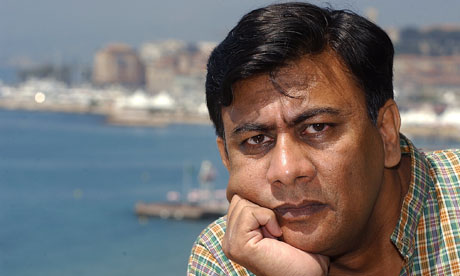Gifted film director whose 2002 feature The Clay Bird won an award at Cannes
At the Cannes film festival in 2002, Matir Moina (The Clay Bird) from Bangladesh came as a revelation. Shown in the Directors' Fortnight competition, the film gained the International Critics' award (Fipresci) for its "authentic, moving and delicate portrayal of a country struggling for its democratic rights", thus becoming the first Bangladeshi film to win a prize at Cannes. The Clay Bird was the first film selected by Bangladesh to compete for an Oscar for best foreign-language film and to be given wide international distribution. It was also the first fiction feature directed by Tareque Masud, who has been killed in a car crash at the age of 54.
 |
| Tareque Masud in Cannes in 2002. The Clay Bird won the Fipresci prize at that year's festival. Photograph: Olivier Laban-Mattei/AFP |
The Clay Bird, which deals with the impact of religious belief on a family's lives during the struggle for Bangladesh's independence from Pakistan in the 1960s, focuses on a young lower-middle-class boy who is sent away by his orthodox Muslim father to a madrasah, much to his mother's dismay. But Masud casts a broader net, showing the diversity and complexity of Bangladeshi life, including its rich musical traditions, and the division between moderate and extremist forces within Islam.
Despite the film's acclaim, the Bangladesh censor board banned it for being too religiously sensitive. However, after much campaigning, the ban was lifted, albeit with small cuts made to the film, and The Clay Bird was shown to huge audiences in Bangladesh. "The problem begins when we try to claim that any belief system is the only solution to every issue and aspect of life," Masud declared. "I wanted to convey my own image of my country, that of a moderate Muslim Bangladesh, and to bring out its social, cultural and political diversity which has nothing to do with its image abroad, of a poor country of famine, flood and fundamentalism."
The Clay Bird was based on Masud's own experiences as a child at a madrasah during the violent civil war between a poorly armed population and the US-backed Pakistani military forces. After independence in 1971, Masud left his religious studies to enter general education, eventually completing a master's degree in history from Dhaka University. He was actively involved in the film society movement from his university days, and participated in numerous courses and workshops on film in Bangladesh and abroad.
Masud's first film, Adam Surat (The Inner Strength), a documentary about the Bangladeshi painter Sheikh Mohammed Sultan, was begun in 1982 and only completed seven years later. By that time, he had met and married the Chicago-born Catherine Shapere, with whom he formed a close working relationship. She produced, co-wrote and edited The Clay Bird, and they directed a number of documentaries together, made by their own production firm Audiovision, based in Dhaka.
Most notable among them was Muktir Kotha (Words of Freedom, 1999), which follows a music troupe who sing songs to inspire freedom fighters during the liberation war of Bangladesh. The film was made mainly based on the footage of the American film-maker Lear Levin that the Masuds discovered in the basement of Levin's house in New York. Another exceptional work was A Kind of Childhood (2002), on the struggles of working children in Dhaka, followed over the course of six years.
Although The Clay Bird received some financial support from the French government and MK2, the Paris-based production and distribution firm, the Masuds invested their life's savings in the film. It took one and a half years to make, using local students, teachers, street children and villagers and real locations, with only two professional actors in the cast.
Masud was overjoyed when he received the Fipresci award at Cannes, which helped launch the film worldwide. (I am proud to have been a member of the jury that year, and to have met both Tareque and Catherine a few times since. They were a delightful couple who managed to be deeply committed to the improvement of Bangladeshi society without ever being pompous or self-righteous.)
At the time of Masud's death, the couple had been working on The Paper Flower, which deals with the problems of the partition of the Indian subcontinent, a sort of prequel to The Clay Bird. The Masuds were returning from visiting locations for the film when their minibus collided head-on with a bus. He was killed instantly, while she was seriously injured.
Catherine and their son, Nishad, survive him.
• Tareque Masud, film director, born 6 December 1956; died 13 August 2011
By: www.guardian.co.uk



No comments:
Post a Comment